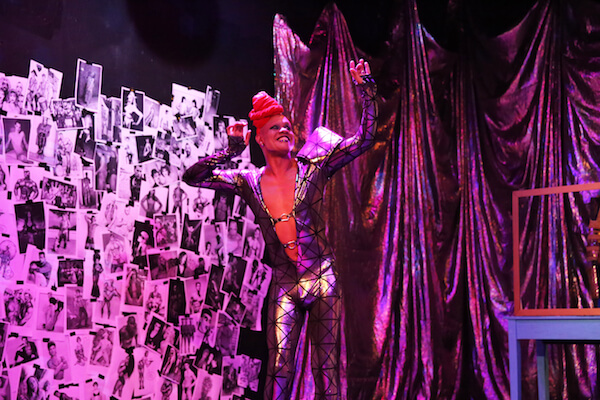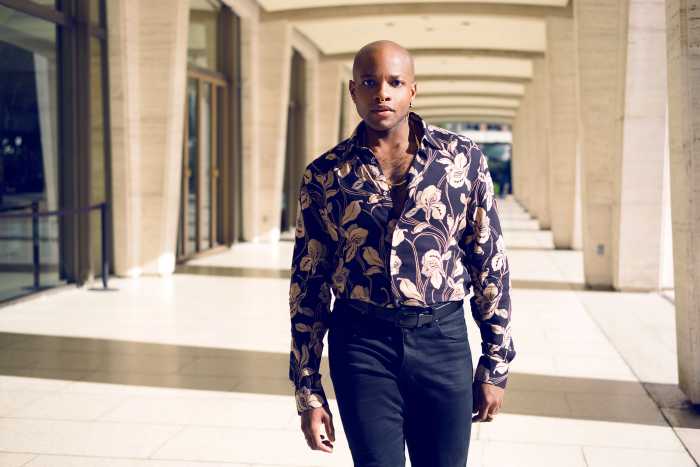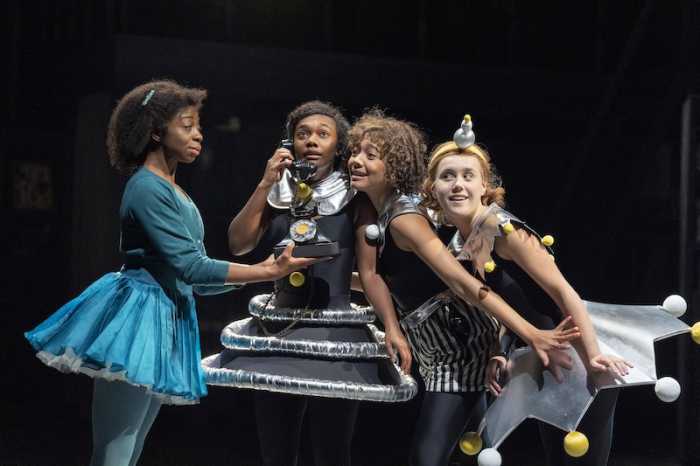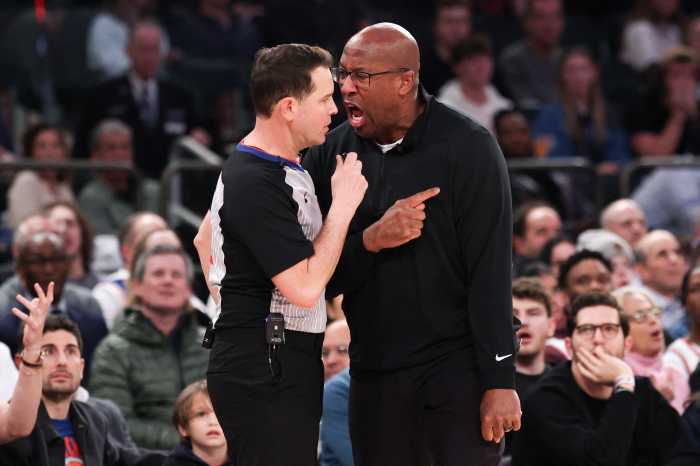Kevin Aviance owns the stage as Mr. Pea, emcee at Trinkets. | LOLA FLASH
Ask if he’s a cop before getting into the car, don’t do anything until you’ve been paid, and contain your stroll to the Village side of the Meatpacking District — because the Chelsea precinct? “They will arrest a bitch in a minute.”
That’s the job training dispensed by skilled and savvy leader of the pack Diva to juicy but naïve new girl Strawberry, as fellow ladies of the night Mistress Blondie (dominatrix fem top) and Janet (sex siren with real breasts) trade insults and swap war stories. Before long, the whole group is strutting their well-choreographed stuff, and out-bad-girling Donna Summer by singing “Walk, Walk The Night,” a salty/ bittersweet take on the world’s oldest profession.
Mary, Dorothy, Toto, whatever your street name is, one thing’s for sure: We’re not in 2018 anymore. It’s the 1990s, and this is the opening scene of Paul E Alexander’s “Trinkets” — an ultimately euphoric but often sobering musical that shines a well-lit, long-overdue spotlight on drag and transsexual prostitutes during an era of uneasy cultural visibility (after the big reveal of “The Crying Game,” a decade until “RuPaul’s Drag Race” premiered, and quite a few years before the LGBT got its Q).
Paul E Alexander’s musical has heart, sass, ass, and stroll
“Bartending, whoring, or being performers. There weren’t many options,” Alexander noted of the musical’s core group of sex workers, whose search for a better life takes them from dangerous streets to welcoming clubs and back again (or, in a perfect world, off to Paris with Mr. Right). “They had this thing inside of them that society didn’t accept or acknowledge,” Alexander said. “There was a struggle: Should I remain how I look or look how I feel?”
That dilemma crystalizes in an exchange familiar to anyone whose parent has appeared, unexpectedly and uninvited, at their workplace. In this case, long-legged hooker Janet (an immaculately assembled Jay Knowles) is forced to defend both job and gender when mother (the diminutive, scene-stealing Sharon Niesp) arrives in a car determined to take her “son” home. Their Dorothy/ Sophia dynamic is effectively played for laughs, until it comes to light that the family has been doing some ghosting. “When Grandma died and we were at the funeral,” Janet recalls, “you never once said to any of your friends there that I was your child… And when I saw the obituary listed every family member by name including all of her great grandchildren, and I was referred to as ‘other grandchild,’ that sealed it.”
Here and throughout, Alexander’s ear for the authentic language and urgent cadence of those on the take, make, or defense is no accident: He based these characters, be they close to the bone or composites, on the people whose real-life gains and losses played out during his time spent as part of Jackie 60 — the legendary weekly party that redefined nightlife in the 1990s, pushing back hard against encroaching homogenization by embracing the full spectrum of human expression. Its introduction of spoken word and performance art into the dance and music mix made Jackie 60 more than a destination for debauchery (effectively weeding out those who only showed up for transgressive thrills).
True to that spirit, Alexander populates the titular club where much of “Trinkets” takes place with hookers both present (our four girls from the opening scene) and past (an ex-streetwalker who married money and owns the place), as well as muscular backup dancers, lithe go-go boys, no-nonsense drug dealers (of the cash-only and bathroom BJ variety), flat-broke johns, and jealous supermodels — plus a famous fashion designer in search of new adventures and nose candy. Broadly played with reckless air kisses and a not-of-this-earth accent by the howlingly funny Nora Burns, Bev Everly’s memorable entrance is based on a Jackie 60 velvet rope incident involving Donatella Versace, Kate Moss, and the tough-but-fair door policy of Kitty Boots (herself a famous London fashion designer who created Jackie 60 with Chi Chi Valenti and DJ Johnny Dynell; see mothernyc.com for the whole story).
Jackie 60’s decade-long run came to an end on the very last day of the previous millennium, with cameras rolling throughout 1999 for a documentary that never materialized, further cementing Alexander’s desire to use “Trinkets” as a means to explore aspects of that era. “At the time, living it, it was very magical, the good and the bad of it all,” he reflected. Another motivating factor: Like Diva (deliciously played with drizzles of sex, sympathy, and sass by multi-pageant title-holder and nightlife host Honey Davenport), Alexander saw the shifting landscape of his own chosen profession and decided to create new opportunities. Having parlayed his emcee and performance skills from the Jackie days into solo underground dance single success, Alexander gained international notoriety as part of the dance-pop trio The Ones (who scored a #1 Dance and #3 Pop hit with “Flawless”).
“Ten years later, after The Ones slowed down” is where Alexander said he found himself, with decades of accumulated memories and stories to tell — which takes us to the present, the “Trinkets” project, and a casting coup whose story parallels his own experience.
“The music business has changed,” Alexander said, in a tone of clear understatement. “No one is buying records like they used to, so we have that in common. What are we going to do now?” The other part of that “we” is fashion designer and nightclub personality Kevin Aviance, whose bold bald look disrupted the drag queen paradigm back in the day and still turns heads (among his hits as a club/ dance musician, “Din Da Da” peaked at #1 on Aug. 23, 1997 and spent 16 weeks on the charts; Billboard put him at 93 in their ranking of all-time most successful dance artists). Basically playing the role Alexander assumed at Jackie 60, Aviance’s Mr. Pea is the emcee who presides over club Trinkets (“Come on in and see how it feels, ’cause tonight you’re in Hell in High Heels.”). The veteran entertainer claims the show’s best-produced, executed, and choreographed number: the club-as-church anthem “Bless This House.”
“We were rivals in the ’90s,” Alexander said of Aviance. “He was the one who inspired me to keep going and put out another song.” Multiple jitney rides en route to a gig on Fire Island one summer cemented their friendship. Now, having collaborated on “Bless This House” (Aviance co-produced with Uri Dalal, from lyrics written by Alexander over a decade ago), Aviance is “the first one to arrive and pretty much the last one to leave, every single show. He’s taken the backstage role, helping the straight guys who are doing drag. He’s just been amazing.” (Aviance’s presence as house mother has served the show well; the colorful 18-member cast varies in their degree of stage experience, but there’s not one dud in the charisma department.)
Asked if the younger members of the cast fully fathom the challenges faced by LGBTQs two decades in the past, Alexander said, “I don’t know if kids can understand the limitations and the struggle. It took these pioneering souls to push forward in a time when it wasn’t de rigueur. I hope they appreciate it now. But I don’t know that they think about history as much as I might have. There’s good aspects and bad aspects of that, because I feel they are who they are; very comfortable in their skins, having transformed at a young age. Whether they be drag queens or transsexuals or gay men, they are living their freedom.”
There’s one area, however, where Alexander doesn’t mind playing the “back in my day” card: his uncompromising placement of a power ballad to send the audience out on a high note. “I’m Proud of Me” has the emotionally exhausted but resolute Diva witnessing the convergence of several story arcs and staring down the prospect of her own future, declaring, “I’m proud of me/ And if no one else will show it/ I’m the one that knows it/ I’m proud of me.”
“I just needed a song to sum it up,” Alexander said, “an ‘And I Am Telling You’-type number. I’ve seen so many shows over the years where it’s all operatic. There’s no song you want to sing from it. ‘Wicked?’ The young queens you see performing these Broadway songs, if you don’t know the story, you don’t get the song. ‘Aquarius,’ ‘Let the Sun Shine In.’ These were songs you could play on the radio. I wanted everyone to walk home singing ‘I’m Proud of Me’ — to be uplifted, to look in the mirror and congratulate themselves. That’s what we need to be doing.”
TRINKETS | Gene Frankel Theatre, 24 Bond St., btwn.Lafayette St. & Bowery | Produced by 24 Bond Arts Center/ Gail Thacker | Through Feb. 3: Thu.-Sun. at 7 p.m.; no performance Jan. 25 | $40; $30 for students & seniors; each night limited $20 tickets at the door | genefrankeltheatre.com or 917-841-7567 | Nintey mins., with intermission






































